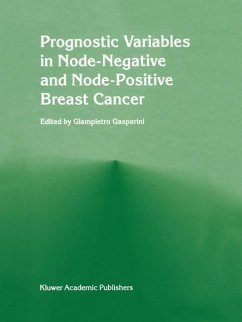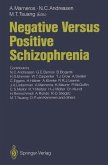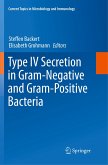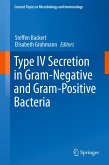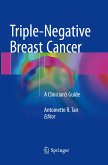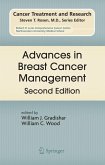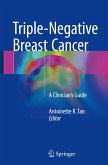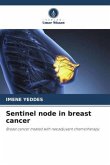Prognostic variables in node-negative and node-positive breast cancer
Herausgegeben:Gasparini, Giampietro
Prognostic variables in node-negative and node-positive breast cancer
Herausgegeben:Gasparini, Giampietro
- Broschiertes Buch
Andere Kunden interessierten sich auch für
![Negative Versus Positive Schizophrenia Negative Versus Positive Schizophrenia]() Negative Versus Positive Schizophrenia75,99 €
Negative Versus Positive Schizophrenia75,99 €![Type IV Secretion in Gram-Negative and Gram-Positive Bacteria Type IV Secretion in Gram-Negative and Gram-Positive Bacteria]() Type IV Secretion in Gram-Negative and Gram-Positive Bacteria108,99 €
Type IV Secretion in Gram-Negative and Gram-Positive Bacteria108,99 €![Type IV Secretion in Gram-Negative and Gram-Positive Bacteria Type IV Secretion in Gram-Negative and Gram-Positive Bacteria]() Type IV Secretion in Gram-Negative and Gram-Positive Bacteria104,99 €
Type IV Secretion in Gram-Negative and Gram-Positive Bacteria104,99 €![Triple-Negative Breast Cancer Triple-Negative Breast Cancer]() Triple-Negative Breast Cancer62,99 €
Triple-Negative Breast Cancer62,99 €![Advances in Breast Cancer Management Advances in Breast Cancer Management]() William J. Gradishar / William C. Wood (eds.)Advances in Breast Cancer Management116,99 €
William J. Gradishar / William C. Wood (eds.)Advances in Breast Cancer Management116,99 €![Triple-Negative Breast Cancer Triple-Negative Breast Cancer]() Triple-Negative Breast Cancer82,99 €
Triple-Negative Breast Cancer82,99 €![Sentinel node in breast cancer Sentinel node in breast cancer]() Imene YeddesSentinel node in breast cancer30,99 €
Imene YeddesSentinel node in breast cancer30,99 €-
-
-
Produktdetails
- Verlag: Springer / Springer US / Springer, Berlin
- Artikelnr. des Verlages: 978-1-4613-7366-7
- 1998
- Seitenzahl: 440
- Erscheinungstermin: 8. Oktober 2012
- Englisch
- Abmessung: 260mm x 195mm x 24mm
- Gewicht: 923g
- ISBN-13: 9781461373667
- ISBN-10: 1461373662
- Artikelnr.: 37032390
- Herstellerkennzeichnung Die Herstellerinformationen sind derzeit nicht verfügbar.
Prognostic variables in node-negative and node-positive breast cancer - Introduction.- Routinely available indicators of prognosis in breast cancer.- Prognostic factors for patients with breast cancers 1cm and smaller.- Steroid hormone receptors in breast cancer management.- S-phase fraction combined with other patient and tumor characteristics for the prognosis of node-negative, estrogen-receptor-positive breast cancer.- S-phase fraction and breast cancer - a decade of experience.- Prognostic and predictive value of thymidine labelling index in breast cancer.- Cyclin D1 in breast cancer.- Cyclins and breast cancer.- Prognostic implications of expression of the cell cycle inhibitor p27Kip1.- The type 1 growth factor receptor family: new ligands and receptors and their role in breast cancer.- c-erbB2 expression predicts tamoxifen efficacy in breast cancer patients.- HER-2/neu as a predictive marker of response to breast cancer therapy.- Prognostic and predictive value of p53 and p21 in breast cancer.- The urokinase plasminogen activator system as a target for prognostic studies in breast cancer.- Metalloproteinases and tissue inhibitors of metalloproteinases.- Matrix metalloproteinase inhibitors.- The 67 kDa laminin receptor as a prognostic factor in human cancer.- Assessment of intratumoral vascularization (angiogenesis) in breast cancer prognosis.- Clinical significance of angiogenic factors in breast cancer.- Insulin-like growth factors in human breast cancer.- Molecular prognostic markers in breast cancer.- Prognostic significance of micrometastatic bone marrow involvement.- Timing of surgery for primary breast cancer with regard to the menstrual phase and prognosis.- Time-dependence of hazard ratios for prognostic factors in primary breast cancer.- Circulatingtumor markers in breast cancer: Accepted utilities and novel prospects.- The relationship between prognostic and predictive factors in the management of breast cancer.- Methodological challenges in the evaluation of prognostic factors in breast cancer.- Assessing the clinical impact of prognostic factors: When is "statistically significant" clinically useful?.- Prognostic variables in node-negative and node-positive breast cancer - editorial.- Author index.
Prognostic variables in node-negative and node-positive breast cancer - Introduction.- Routinely available indicators of prognosis in breast cancer.- Prognostic factors for patients with breast cancers 1cm and smaller.- Steroid hormone receptors in breast cancer management.- S-phase fraction combined with other patient and tumor characteristics for the prognosis of node-negative, estrogen-receptor-positive breast cancer.- S-phase fraction and breast cancer - a decade of experience.- Prognostic and predictive value of thymidine labelling index in breast cancer.- Cyclin D1 in breast cancer.- Cyclins and breast cancer.- Prognostic implications of expression of the cell cycle inhibitor p27Kip1.- The type 1 growth factor receptor family: new ligands and receptors and their role in breast cancer.- c-erbB2 expression predicts tamoxifen efficacy in breast cancer patients.- HER-2/neu as a predictive marker of response to breast cancer therapy.- Prognostic and predictive value of p53 and p21 in breast cancer.- The urokinase plasminogen activator system as a target for prognostic studies in breast cancer.- Metalloproteinases and tissue inhibitors of metalloproteinases.- Matrix metalloproteinase inhibitors.- The 67 kDa laminin receptor as a prognostic factor in human cancer.- Assessment of intratumoral vascularization (angiogenesis) in breast cancer prognosis.- Clinical significance of angiogenic factors in breast cancer.- Insulin-like growth factors in human breast cancer.- Molecular prognostic markers in breast cancer.- Prognostic significance of micrometastatic bone marrow involvement.- Timing of surgery for primary breast cancer with regard to the menstrual phase and prognosis.- Time-dependence of hazard ratios for prognostic factors in primary breast cancer.- Circulatingtumor markers in breast cancer: Accepted utilities and novel prospects.- The relationship between prognostic and predictive factors in the management of breast cancer.- Methodological challenges in the evaluation of prognostic factors in breast cancer.- Assessing the clinical impact of prognostic factors: When is "statistically significant" clinically useful?.- Prognostic variables in node-negative and node-positive breast cancer - editorial.- Author index.

